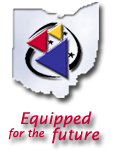Title of Activity 1: Ohio's Big Picture
Time: 40 m
Who: ODE Consultant
Purpose: To explain EFF outcomes based on the Quality Model and how outcomes become goals for EFF and National education goal 6 and why Ohio chose EFF.
Key discoveries: How EFF supports quality services, capacity building and continuous improvement for the Ohio Aspire system.
Target audience: Administrators and Teachers
Format: PowerPoint Presentation
Materials:
- "Results That Matter" booklets (this can be ordered here)
- Ohio's Strategic Plan
- Timeline with Ohio events
Facilitation notes:
Links to other activities: Spring Director's meeting
Description of Activity: PowerPoint presentation
EFF ORIENTATION - Taking the Mystery Out of EFF - State Staff
VISION - Create and maintain the Best System to deliver Foundations Skills to adults in Ohio
ODE Aspire GOAL 1 - Define and raise expectations of what Aspire students should know and be able to do.
Aspire STRATEGY - Develop a plan for phased implementation of the Equipped for the Future (EFF) Quality Model.
- A. Develop appropriate student content standards and competencies.
B. Align curriculum models and assessment.
C. Develop examples of instruction.
D. Clarify and communicate Ohio's expectations for what all students should know and be able to do.
EFF QUALITY MODEL - A Model for Program Improvement
WHAT IS EFF? - A Standards-based reform initiative that enables us to align
- Program practices
- Curriculum and Instruction
- Assessment
- Reporting with important results defined by adult learners
WHY EFF?
- Response to National Goal 6 and Ohio's Goal 5
- EFF is "Customer-driven"
- EFF is based on educational theory and research
WHAT DO STUDENTS WANT?
- Access information
- Express their own ideas
- Take independent Action
- Keep up with a changing world
- Exercise their rights and responsibilities as Family Members, Workers, and Community Members
EFF CREATES A SYSTEM TO ACHIEVE THE PURPOSES
- Content Framework
- Assessment Framework
- Support for Implementation
CONNECTING GOAL TO MODEL diagram
- FIVE PROGRAM PRACTICES
- Purposeful and Transparent
- Contextualized Approach
- Constructivist Approach
- Approach to Assessment based on Cognitive Science
- Systematic Approach to Program Improvement
ASSESSMENT
- More reliance on Alternative Assessments - i.e. Performance Assessments (Next steps in the Development of the Uniform Portfolio System)
- More student involvement in the Portfolio Process
- Develop assessment tools that determine how students are progressing on a continuum of skills
- Construct assessment tasks, rubrics, and other tools
- Use results of assessment to monitor the progress toward the students' learning goals
ACCOUNTABILITY - A SYTEMATIC APPROACH TO PROGRAM IMPROVEMENT
- ABLELink can provide important data
- Use data for review of program components
- Use data to revise program goals
- Use student data to monitor progress along a continuum
- Review data periodically to revise students' goals and learning plan
- Students identify and share evidence of how they use EFF skills to achieve goals/purposes in their lives
OUTCOMES - Outcomes observed through field development have been reported on several levels including:
- Student
- Teacher
- Program
- System
PROGRAM OUTCOMES
- Program components are aligned - SEM
- Curriculum structured around real-life contexts related to students' goals
- Success is described in terms of real-world results in students' lives
- EFF framework is used in teacher hiring and evaluation
- Collaborative staff teams are supported
LOOKING TO THE FUTURE
- EFF Orientations beginning in January to provide you with
- a better understanding of practices
- initial activities to implement the standards
- Requiring a team approach to implement the EFF quality model
- minimum of administrator and teacher
- Aspire grant for fiscal years 2003 and 2004 will reflect the minimum expectations of EFF implementation
- Revised Indicators of Program Quality will reflect the expected outcomes
- Using a team approach, programs will be asked to write an action plan for the two-year grant period
POSSIBLE ELEMENTS OF AN EFF PLAN
- Professional development process - PPDPs and IPDPs
- Plan for training staff on EFF orientation, standards, and Uniform Portfolio System (possible institute)
- Program changes to support new initiative - "Going to Scale" steps.
Words of an Adult Learner
Literacy means how to read, spell, write and how to work in the workforce. Literacy includes being able to read the newspaper and keep up with the daily news, business and world affairs. Before I learned how to read I wasn't able to read books to my children. Now that I can read better, it fills an empty space inside me.
